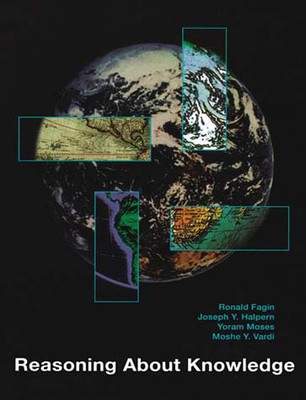
- We will send in 10–14 business days.
- Author: Ronald Fagin
- Publisher: MIT Press
- ISBN-10: 0262562006
- ISBN-13: 9780262562003
- Format: 17.7 x 22.6 x 2.6 cm, softcover
- Language: English
- SAVE -10% with code: EXTRA
Reviews
Description
Reasoning about knowledge--particularly the knowledge of agents who reason about the world and each other's knowledge--was once the exclusive province of philosophers and puzzle solvers. More recently, this type of reasoning has been shown to play a key role in a surprising number of contexts, from understanding conversations to the analysis of distributed computer algorithms. Reasoning About Knowledge is the first book to provide a general discussion of approaches to reasoning about knowledge and its applications to distributed systems, artificial intelligence, and game theory. It brings eight years of work by the authors into a cohesive framework for understanding and analyzing reasoning about knowledge that is intuitive, mathematically well founded, useful in practice, and widely applicable. The book is almost completely self-contained and should be accessible to readers in a variety of disciplines, including computer science, artificial intelligence, linguistics, philosophy, cognitive science, and game theory. Each chapter includes exercises and bibliographic notes.
EXTRA 10 % discount with code: EXTRA
The promotion ends in 16d.06:40:49
The discount code is valid when purchasing from 10 €. Discounts do not stack.
- Author: Ronald Fagin
- Publisher: MIT Press
- ISBN-10: 0262562006
- ISBN-13: 9780262562003
- Format: 17.7 x 22.6 x 2.6 cm, softcover
- Language: English English
Reasoning about knowledge--particularly the knowledge of agents who reason about the world and each other's knowledge--was once the exclusive province of philosophers and puzzle solvers. More recently, this type of reasoning has been shown to play a key role in a surprising number of contexts, from understanding conversations to the analysis of distributed computer algorithms. Reasoning About Knowledge is the first book to provide a general discussion of approaches to reasoning about knowledge and its applications to distributed systems, artificial intelligence, and game theory. It brings eight years of work by the authors into a cohesive framework for understanding and analyzing reasoning about knowledge that is intuitive, mathematically well founded, useful in practice, and widely applicable. The book is almost completely self-contained and should be accessible to readers in a variety of disciplines, including computer science, artificial intelligence, linguistics, philosophy, cognitive science, and game theory. Each chapter includes exercises and bibliographic notes.


Reviews